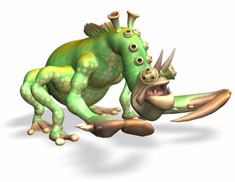 It turns out Electronic Art’s Spore has some digital rights management (DRM) under the hood that’s irking a few video game players. We use the term “few” lightly, as game players use their voices to be heard and let them ring loud! Taking a gander at Amazon.com’s listing of Spore and you’ll see 797 customer reviews with an average rating of 1-star.
It turns out Electronic Art’s Spore has some digital rights management (DRM) under the hood that’s irking a few video game players. We use the term “few” lightly, as game players use their voices to be heard and let them ring loud! Taking a gander at Amazon.com’s listing of Spore and you’ll see 797 customer reviews with an average rating of 1-star.
What’s the problem with the DRM? It’s almost easier to ask what isn’t the problem with the DRM in Spore. First, it’s intrusive, install Spore more than three times and you’ll have to call Electronic Arts to have them re-activate the game. Are we renting games now?
To re-activate your game with one more additional install will require you to give proof of purchase, so the comments say and, pretty much, you’re assumed to be pirating the product immediately. That might be over-reacting, a bit, but not really much considering the limitations on the product.
What if the DRM solution goes wrong? What if the game cannot access the Internet upon installation? There are plenty of what-if scenarios one can play out when they find their precious $50.00 game is phoning home to protect itself from you and your habits.
“This caused EA to remove the requirement that the game authenticate online every ten days, changing it to authentication whenever new content was added to the title. Unfortunately, that doesn’t seem to be enough, and the limit on installations is what gamers are now finding most heinous. Review-bombing Amazon is a particularly nasty way of getting the point across as well; casual gamers who aren’t aware of this campaign may not bother to read the content of the reviews and only assume the game isn’t very good.” (arstechnica)
No doubt all the negative press will result in a full on revolt, having gamers who’ve not purchased the title ding it with a 1-star to prove a point, why not? How else shall we fight “the man” and their unholy DRM solutions.
Oddly enough, you can find the game pirated already across the Internet, what has this proven? The game was found on torrent sites before it’s release, already cracked. It’s said they’re using a Sony DRM solution, a known DRM solution, which means hackers whom have already cracked this protection before had it un-shelled in a matter of hours.
What did the DRM get Electronic Arts but a PR nightmare and a bunch of people stealing it off the Internet now that they know it’s already available? Lot’s of publicity for very little gain; imagine the reviews and comments had they chosen to go without a DRM solution and be a pioneer of future technological solutions.Sure, it would be on a torrent site within hours… but it was anyway.

 David Braben, founder of Frontier Developments, says retail outlets that buy and sell pre-owned games are “essentially defrauding the industry.” Although multiplayer gaming might not be a huge threat, the single player experience in games may die out because gamers play the game quickly and resell it back to places like GameStop for others to buy.
David Braben, founder of Frontier Developments, says retail outlets that buy and sell pre-owned games are “essentially defrauding the industry.” Although multiplayer gaming might not be a huge threat, the single player experience in games may die out because gamers play the game quickly and resell it back to places like GameStop for others to buy. Formerly Green Monster Games, 38 Studios is growing a large pool of talented folks for their MMO endeavor. First, we heard R.A. Salvatore (writer of the Dark Elf series) was heading over to work on a story, art direction by Todd McFarlane (creator of Spawn) and now Irena Pereira from Blizzard and a sound designer, Aubrey Hodges.
Formerly Green Monster Games, 38 Studios is growing a large pool of talented folks for their MMO endeavor. First, we heard R.A. Salvatore (writer of the Dark Elf series) was heading over to work on a story, art direction by Todd McFarlane (creator of Spawn) and now Irena Pereira from Blizzard and a sound designer, Aubrey Hodges. Imagine a world of DRM free spore and you may be imagining reality using the Valve’s Steam software download architecture.
Imagine a world of DRM free spore and you may be imagining reality using the Valve’s Steam software download architecture.
I´m one of the lucky ones that were informed about this Drm at time. SO as a furious unsatisfied customer( I want to buy and play the game), I want this riot to hit high, as big newspapers and gamming sites. Will they have the courage to voice the people.
I´m one of the lucky ones that were informed about this Drm at time. SO as a furious unsatisfied customer( I want to buy and play the game), I want this riot to hit high, as big newspapers and gamming sites. Will they have the courage to voice the people.
I’m enjoying Spore a lot, DRM or no.
I’m enjoying Spore a lot, DRM or no.